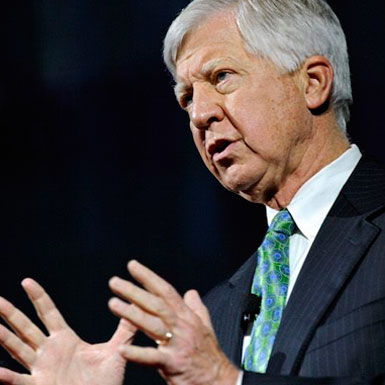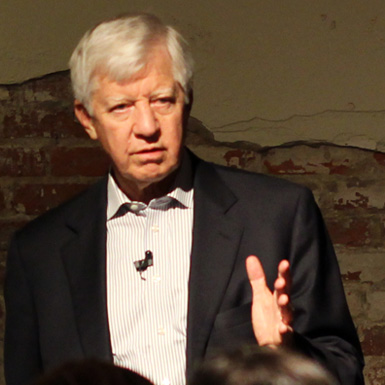The VW scandal, like every good scandal before it, has left business leaders wondering where exactly it all went wrong, who at VW is behind it and whether the brand can recover.
It even spawned a hashtag, #dieselgate, which has become the world’s unofficial forum for discussing causes of the crisis and its possible fixes – all while aiming a healthy amount of frustration and resentment at the company’s top executives.
We spoke to respected leadership influencers Bill George and Amy Edmondson, both Harvard Business School professors and prominent authors, to get their take on what business leaders can learn from the scandal.
These are, as Bill puts it, devastating times for VW.
For the traditionally well respected brand, the emissions scandal is a major breach of trust – and it’s the pre-meditated, calculated aspect of the violation that makes it so hard to swallow.
There’s no doubt that, in Amy’s words, “it’s actively deceptive, an act of fraud”, but the real question we’ve all been asking is this: how far up the corporate chain does it go?
If we were to believe the CEO of VW USA Michael Horn, not very far at all.
Horn, facing a grilling before US Congress last week, was to be seen accepting little of the blame: “This was not a corporate decision. No board meeting […] has authorised this. This was a couple of rogue software engineers who put this [deception device] in for whatever reason”.
This is, at best, a flimsy excuse.
As Bill wryly observes of the hearing, “Mr. Horn did not distinguish himself in the eyes of the public”.
Leadership Lesson #1: Take Full Responsibility.
It’s in the VW response we find clues to our first leadership lesson: to err is to be human, but to cover up is to sin.
“The cover-up can be worse than the crime”, Amy points out.
When the issue is that of broken trust, deflecting questions, acting slippery and distancing themselves from “the real villains” is one of the worst things VW executives can be seen doing.
It’s unlikely that anyone other than those involved know the truth of the matter, but it’s exactly this kernel of truth that needs to come out.
“The new CEO needs to be very hard-nosed in getting out publicly exactly who is responsible”, argues Bill – “the longer they withhold that information for, the harder it’s going to be”.
VW’s management of the crisis up to this point, then, has been less than ideal.
Although their senior leaders seem to be contrite – “We’ve totally screwed up”, admits Horn – this contrition runs barely skin deep.
Scapegoating and proclamations of C-Level innocence aren’t likely techniques to win any CEO of The Year awards, regardless of whether such proclamations are true.
Horn and his colleagues are equating innocence with ignorance, but ignorance is no excuse, says Amy:
“If the top officer of the corporation doesn’t know what’s happening that’s problematic – a serious leadership failure. Whether you know or not, you’re still responsible. You’re responsible for creating the culture that tells people what to do in the absence of prescriptive rules. This is a situation exactly like that”.
The real issue here is that of company culture. It’s what Bill calls the “executive responsibility” – whether your people feel that they can get away with breaching practices.
Which brings us to our second major leadership lesson.
Leadership Lesson #2: Culture Is The CEO’s Job.
Top executives might not know everything that’s going on in their company, but setting standards at the macro-level means guiding decisions at the micro-level.
To put it bluntly, if the leadership team had done its job and built the company culture on the right foundations, we wouldn’t be having this discussion.
Without doubt, the ever-increasing globalisation of business plays a role here – but it also can’t be used as an excuse.
As former Chairman and CEO of Medtronic, a medical device company which operates in 140 companies, Bill certainly understands firsthand the difficulties of operating across continents:
“These events should bring home to every company in the world that when you’re operating in another country you have obligations in terms of their law and compliance. You have to go along with whichever laws they have in place, whether or not you agree with them, and that’s the Chief Executive’s job – to go out and speak to different people on the front-line in every country and ensure people are compliant.”
There’s no point crying over spilt milk, though. The real question is, what next?
For Amy, “what must come out of this is a top to bottom soul-searching. An evaluation of the culture, of the technical processes, of everything”.
The VW leadership team has remarkable challenge ahead of it. Broadly, they have a choice to view the crisis as either:
- a crappy problem they must survive through, or
- a remarkable opportunity to shake up and rebuild the company – for the better
Their choice will determine the direction of all their subsequent strategies and will determine the future of VW.
Leadership Lesson #3: Leverage The Silver Lining.
Experienced businesspeople know that every crisis tends to be an opportunity in disguise.
As leaders we learn and grow the most not when business is sailing smoothly, but when times are tough.
Which points to our next leadership lesson: VW can leverage this scandal to radically change how its people (as well as its customers, business partners and the society at large) think about work, performance and the environment.
Just like reformed ex-murderers become champions of human rights, in a bold move VW could use the story of its own turnaround to position itself as a champion of conscious, high-performance work culture and environmental protection.
Far fetched? Definitely. Difficult? Yes. Worth trying? Also yes. Will it be considered at the board level? Maybe. Will it be attempted? If current VW response is anything to go by, probably not.
Leadership Lesson #4: ROI of Authentic Leadership.
The crisis extends beyond VW.
One of the major implications of such scandals is the narrative they construct and play into: the narrative, as Bill notes, “of all business people being dishonest until you catch them. It’s a horrible narrative, but it’s damaging to business as a whole”.
This means businesses worldwide have work to do in the wake of the VW scandal.
“Other companies need to be very clear about differentiating themselves”, says Bill, “introducing testing of their own and assessing their own processes. Businesses can differentiate themselves here, because this was a moral failure. It was not an inadvertent mistake.”
For Amy, “the object lesson here is that there’s very powerful vicarious learning to be done. If other leaders aren’t taking this lesson to heart, they’re wasting the opportunity.
Executives need to take the opportunity to assess – where could we be falling short on our promise to customers and society? How can we resolve that?”
Which brings us to perhaps the most powerful leadership lesson of all: the truth will always out.
It’s a lesson, Amy notes, that it’s surprising we still have to teach: that “nowadays all secrets have expiration dates; there’s no such thing as a permanent secret”.
It’s this point that proves most salient, as the scandal rolls on: ability to lead with authenticity and integrity is a skill that’s in demand more than ever.
This article was originally posted on arielle.com


 On October 14, 2015, I visited Raleigh, NC, to address a gathering of local business
On October 14, 2015, I visited Raleigh, NC, to address a gathering of local business